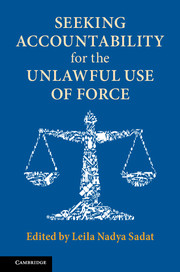Book contents
- Frontmatter
- Dedication
- Contents
- Notes on Contributors
- Foreword
- Preface
- Table of Cases
- Introduction
- PART I HISTORIC AND CONTEMPORARY PERSPECTIVES ON THE UNLAWFUL USE OF FORCE
- 1 The Status of Aggression in International Law from Versailles to Kampala – and What the Future Might Hold
- 2 Nuremberg and Aggressive War
- 3 The Tokyo International Military Tribunal and Crimes Against Peace (Aggression): Is There Anything to Learn?
- 4 The Just War in Ancient Legal Thought
- 5 Definitions of Aggression as Harbingers of International Change
- 6 International Humanitarian Law in an Age of Extremes: Unlawful Uses of Force by Non-State Actors
- PART II MECHANISMS FOR RESTRAINING THE UNLAWFUL USE OF FORCE AND ENHANCING ACCOUNTABILITY
- PART III THE ILLEGAL USE OF FORCE AND THE PROSECUTION OF INTERNATIONAL CRIMES
- PART IV IMAGINING A BETTER WORLD
- Epilogue
- Index
2 - Nuremberg and Aggressive War
from PART I - HISTORIC AND CONTEMPORARY PERSPECTIVES ON THE UNLAWFUL USE OF FORCE
Published online by Cambridge University Press: 21 May 2018
- Frontmatter
- Dedication
- Contents
- Notes on Contributors
- Foreword
- Preface
- Table of Cases
- Introduction
- PART I HISTORIC AND CONTEMPORARY PERSPECTIVES ON THE UNLAWFUL USE OF FORCE
- 1 The Status of Aggression in International Law from Versailles to Kampala – and What the Future Might Hold
- 2 Nuremberg and Aggressive War
- 3 The Tokyo International Military Tribunal and Crimes Against Peace (Aggression): Is There Anything to Learn?
- 4 The Just War in Ancient Legal Thought
- 5 Definitions of Aggression as Harbingers of International Change
- 6 International Humanitarian Law in an Age of Extremes: Unlawful Uses of Force by Non-State Actors
- PART II MECHANISMS FOR RESTRAINING THE UNLAWFUL USE OF FORCE AND ENHANCING ACCOUNTABILITY
- PART III THE ILLEGAL USE OF FORCE AND THE PROSECUTION OF INTERNATIONAL CRIMES
- PART IV IMAGINING A BETTER WORLD
- Epilogue
- Index
Summary
INTRODUCTION
Responding to a motion filed by the defendants challenging the charge of crimes against peace as a violation of the principle of legality, the International Military Tribunal held that the maxim nullum crimen sine lege “has no application to the present facts.” According to the four judges,
Occupying the positions they did in the Government of Germany, the defendants, or at least some of them must have known of the treaties signed by Germany, outlawing recourse to war for the settlement of international disputes; they must have known that they were acting in defiance of all international law when in complete deliberation they carried out the designs of invasion and aggression.
They said their view was “strongly reinforced by a consideration of the state of international law in 1939, so far as aggressive war is concerned.”
The Tribunal cited many sources, notably the 1928 Kellogg–Briand Pact, confirming the prohibition of aggressive war, but it did not provide any authority supporting its criminalization. That individuals might be punished following criminal trial for their involvement in acts of aggressive war had of course been debated since 1919 when France, apparently at Clemenceau's personal instigation, submitted a discussion paper to the Commission on Responsibility stating:
[T]hat there is between nations as between individuals a true regime of right, namely, the principle of the responsibility, not only political but legal, of the people who go to war in order to steal from a neighbouring State some provinces against the will of their populations and because they either wish to secure the wealth these provinces contain or to ruin their industries and their commerce.
However, Sub-Commission II recommended that German leaders, including the Emperor, should not be charged for “the acts which provoked the war and its initiation.” The finding was confirmed in the final report of the Commission:
The premeditation of a war of aggression, dissimulated under a peaceful pretence, then suddenly declared under false pretexts, is conduct which the public conscience reproves and which history will condemn, but by reason of the purely optional character of the institutions at The Hague for the maintenance of peace (International Commission of Inquiry, Mediation and Arbitration)
- Type
- Chapter
- Information
- Seeking Accountability for the Unlawful Use of Force , pp. 58 - 79Publisher: Cambridge University PressPrint publication year: 2018
- 1
- Cited by



